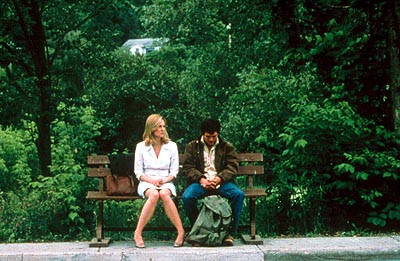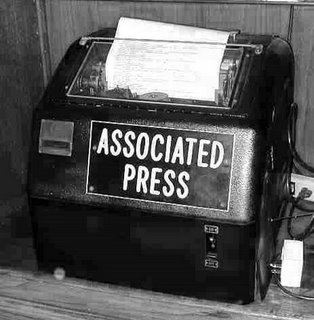“I have never known a novel that was good enough to be good in spite of its being adapted to the author’s political views.”
Edith Wharton, letter to Upton Sinclair (Aug. 19, 1927)
Archives for September 2009
TT: Snapshot
Robert Frost talks about poetry:
(This is the latest in a weekly series of arts-related videos that appear in this space each Wednesday.)
TT: Tall stack
I wrote about film regularly between 1998 and 2005, and at the end of that time I drew up a double-barreled list of the movies I’d reviewed that I liked best.
 These were the top twenty: The Apostle, Barbershop, Bright Young Things, Croupier, The Dreamlife of Angels, Election, Ghost World, High Fidelity, The Incredibles, The Last Days of Disco, Look at Me, Lost in Translation, Next Stop Wonderland, Out of Sight, Panic, The Sixth Sense, Spellbound, The Station Agent, Topsy-Turvy, and You Can Count on Me. (Junebug should have made that list as well, but I saw it a week after I filed my last review.)
These were the top twenty: The Apostle, Barbershop, Bright Young Things, Croupier, The Dreamlife of Angels, Election, Ghost World, High Fidelity, The Incredibles, The Last Days of Disco, Look at Me, Lost in Translation, Next Stop Wonderland, Out of Sight, Panic, The Sixth Sense, Spellbound, The Station Agent, Topsy-Turvy, and You Can Count on Me. (Junebug should have made that list as well, but I saw it a week after I filed my last review.)
These were the runners-up: About Schmidt, Being John Malkovich, The Cooler, Eternal Sunshine of the Spotless Mind, Garden State, Guinevere, The Life Aquatic with Steve Zissou, Lilo & Stitch, The Limey, Lovely and Amazing, Magnolia, Master and Commander: The Far Side of the World, Me and You and Everyone We Know, Pi, Ripley’s Game, The Secret Lives of Dentists, Sideways, Sunshine State, Talk to Her, The Tao of Steve, The Whole Nine Yards, and Three Kings.
Those were the days!
TT: Almanac
“True originality consists not in a new manner but in a new vision.”
Edith Wharton, The Writing of Fiction
TT: Things I miss
• Creepy Crawlers. I’ve never enjoyed a Christmas present more than this one, which my parents gave me in 1964:
• Short subjects. I’m grateful beyond words that the coming of home video has made it possible for me to enjoy the adventures of Bugs Bunny and Wile E. Coyote at will in the comfort of my living room, but the only way to properly appreciate animated cartoons is to view them one at a time in a theater, screened in tandem with a full-length film. I’m just old enough to remember theatrical short subjects, and I loved it that you never knew what you’d see from week to week. It wasn’t at all uncommon for the cartoon of the week to be more interesting than the feature that followed it. Can you imagine strolling into a movie house in 1947 to see Good News or Lady in the Lake and finding yourself confronted with something as bizarre as Tex Avery’s “King-Size Canary”?
• Fizzies. Forgotten but not gone, I’m pleased to say, though the company that reintroduced this long-discontinued Alka-Seltzer-style effervescent drink tablet in 2006 has somehow neglected to resurrect grape, my favorite flavor. In any case, I have yet to see the new Fizzies on sale in stores, much less advertised on Saturday-morning TV:
• Rooftop TV antennas. I don’t miss the lamentably fuzzy reception that they provided, or the fact that my family could only pick up three channels in Smalltown, U.S.A. (I never saw a public-TV program until I went off to college in 1974.) On the other hand, I loved being able to climb onto the roof of our house via the antenna pole. To do so was a hanging offense at 713 Hickory Drive, mainly because it terrified my mother, who was sure–not without reason–that her hopelessly clumsy son would fall off the roof and break his neck. I never did, but it’s a wonder that I didn’t.
Could it be that I secretly envied those adventurous classmates who, unlike me, broke an arm or a leg at play and thereafter were privileged to wear a plaster cast on which all their friends scribbled messages of good cheer? I wouldn’t be at all surprised.
• My World and Welcome to It. Once upon a time it was possible–just–for a half-hour prime-time network sitcom to start out like this:
My World and Welcome to It, which made its debut on NBC in the fall of 1969, ran for less than a year, but I watched every episode, and marveled at the deftness with which the show’s creators transformed the cartoons and stories of James Thurber on which their scripts were based.
A decade later I had the good fortune to meet William Windom, who was touring in a one-man show in which he played Thurber, and told him how much the series had meant to me. I could tell how surprised he was that it had made so strong an impression on so young a person.
 • Teletypes. Long before CNN was a glimmer in Ted Turner’s eye, teletypes transmitted breaking news around the world. When I was a boy, every newsroom in America still contained one or more of these marvelous mechanical monsters, which printed wire-service copy onto endless strips of cheap yellow copy paper.
• Teletypes. Long before CNN was a glimmer in Ted Turner’s eye, teletypes transmitted breaking news around the world. When I was a boy, every newsroom in America still contained one or more of these marvelous mechanical monsters, which printed wire-service copy onto endless strips of cheap yellow copy paper.
The sound they made evoked newspaper journalism at its most hectic, which is undoubtedly the reason why the producers of The CBS Evening News with Walter Cronkite took care that a teletype could be heard clacking away in the background throughout the program’s early years:
If Uncle Walter got his news from an AP teletype, you knew it had to be true.
I found teletypes unimaginably romantic, and was disappointed to find that computer terminals had rendered them obsolete long before I landed my first full-time newspaper job in 1987. Now they belong to the ages.
 • Porch swings. I paid tribute to my grandmother’s porch swing in my first book, a memoir that I wrote in 1991:
• Porch swings. I paid tribute to my grandmother’s porch swing in my first book, a memoir that I wrote in 1991:
After the last firecracker was lit and tossed, I crawled into the wooden swing on the crumbling front porch of my grandmother’s house and rocked in the breeze. Once in a while I brought a book with me, for there are few things as pleasant as reading a good book while sitting in a porch swing on a breezy summer day. More often, though, I left my book in the car, especially after my spindly legs grew long enough to reach the concrete floor of the porch. Then I would sit at the very edge of the broad wooden seat, kick as hard as I could and push the swing higher and higher into the air, high enough that the soles of my sneakers scraped the ceiling and the heavy chains of the swing gave off a scary thump every time I fell back to earth. The higher I swung, the surer I was that the rusty bolts would gradually work their way out of the rotten wood of the ceiling, sending me flying through the air to a bloody but glorious death. Before long, one of the old people always came stomping out of the house and told me to cut it out before I cracked my fool head open.
The house is still there, but the swing, like my youth, is long gone.
TT: Almanac
“Another unsettling element in modern art is that common symptom of immaturity, the dread of doing what has been done before.”
Edith Wharton, The Writing of Fiction
TT: Short stack
 In honor of the release of its new DVD edition of The Last Days of Disco, the folks at the Criterion Collection invited Whit Stillman to submit a top-ten list of his favorite Criterion releases. He chose Mario Monicelli’s Big Deal on Madonna Street, Marcel Camus’ Black Orpheus, Marcel Carné’s Children of Paradise, François Truffaut’s The 400 Blows, Perry Henzell’s The Harder They Come, Preston Sturges’ The Lady Eve, Alfred Hitchcock’s The Lady Vanishes, Gregory La Cava’s My Man Godfrey, Hitchcock’s Notorious, and Ingmar Bergman’s The Seventh Seal, and his comments on each film are both astute and revealing.
In honor of the release of its new DVD edition of The Last Days of Disco, the folks at the Criterion Collection invited Whit Stillman to submit a top-ten list of his favorite Criterion releases. He chose Mario Monicelli’s Big Deal on Madonna Street, Marcel Camus’ Black Orpheus, Marcel Carné’s Children of Paradise, François Truffaut’s The 400 Blows, Perry Henzell’s The Harder They Come, Preston Sturges’ The Lady Eve, Alfred Hitchcock’s The Lady Vanishes, Gregory La Cava’s My Man Godfrey, Hitchcock’s Notorious, and Ingmar Bergman’s The Seventh Seal, and his comments on each film are both astute and revealing.
What would I choose from the Criterion catalogue? I like nearly all of the films on Whit’s list, but only one, The Lady Eve, would make my personal top ten. Here are my other nine picks, in alphabetical order:
• Michael Powell’s I Know Where I’m Going!
• Noah Baumbach’s Kicking and Screaming
• Wes Anderson’s The Life Aquatic with Steve Zissou
• Whit Stillman’s Metropolitan
• Samuel Fuller’s Pickup on South Street
• Jean Renoir’s The Rules of the Game (of course!)
• François Truffaut’s Shoot the Piano Player
• Carol Reed’s The Third Man
• Ernst Lubitsch’s Trouble in Paradise
Runners-up: Billy Wilder’s Ace in the Hole, Kevin Smith’s Chasing Amy, Ronald Neame’s Hopscotch, Hitchcock’s Notorious, and Renoir’s The River.
Surprised?
P.S. I encourage my co-bloggers to do likewise!
TT: The function of book blogging at the present time
Patrick Kurp of Anecdotal Evidence and D.G. Myers of A Commonplace Blog are jointly conducting a serial symposium called “The Function of Book Blogging at the Present Time” whose participants have been invited to “speculate about the past, present, and future of this youngest of literary genres.” Even though I’m not strictly a book blogger, they asked me to join the fray anyway. Here’s my contribution. Their questions are followed by my answers:
• What are the non-electronic precursors of book blogging?
Diaries, letters, commonplace books, periodical essays. I think of blogging as introspection made public.
• Who do you look toward for inspiration and models?
No one. I’ve been blogging for six years–much longer than most artbloggers–and it stands to reason that I should have a pretty clear idea by now of what I want to do and how I want to do it.
• How does book blogging differ from print counterparts such as book reviews?
For me, the only difference (other than the absence of a paycheck) is brevity and the constraints it imposes. I write the same way everywhere.
• How do you respond to this statement?–Blogging is just another hobby, like stamp collecting or hockey.
It depends on how you blog–and how you define “hobby.” I’d say it’s more like painting for pleasure, or playing chamber music in the home. If you think those are hobbies, then so is book blogging.
• How has the experience of blogging changed the way you write?
I think it’s probably reinforced my tendency to write in a conversational style–but, then, I’ve always tried to write the way I talk.
• What about the sometimes vicious nature of the beast?–the ad hominem attacks, and the widespread tendency to confuse harsh disagreement with such ad hominem attacks.
To blog is to become a public figure. Ad hominem attacks go with the territory. If you can’t stand the flames, log off.
• Some say the golden age of blogging has already passed, that blogging has failed to fulfill its early promise; and the evidence which is given is that no one becomes famous from blogging any longer. Do you agree?
Er, who are all those “famous” book bloggers? Blogging is no longer a novelty, but artblogging of all sorts, including literate commentary on literature, has always been a minority pursuit and always will be.
• In a recent blog column, the technology writer Michael S. Malone suggests that a handful of bloggers have “earned huge audiences, while millions of others have not,” because readers have learned to trust the more popular bloggers “to either consistently entertain us, or we trust their judgment in selecting interesting items for us to read, or we trust that their world view is just like our own and their ability to enunciate those views even better.” Do you agree? Does this explain why no book blogger has earned a huge audience?
I think this is true, but I also think it’s irrelevant to book blogging, for the reasons specified above. No book blogger will ever earn a huge audience, unless he limits himself to commentary on the novels of Dan Brown or J.K. Rowling.
• Are book bloggers wise or foolish to include political commentary?
It depends on whether you identify wisdom with traffic. I’m much less likely to pay attention to any critic of the arts who sees the world through politics-colored glasses–whatever their shade–but I suspect that the average reader feels differently.
